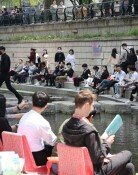`Wars against trade union` by David Cameron
`Wars against trade union` by David Cameron
Posted July. 17, 2015 07:09,
Early 1979 was the winter of complaints for the British. Mass strikes halted the operations of factories, and trains and subways stopped running. Streets were filled with piles of garbage and fire engines and ambulance cars were left neglected. Not having wanted to upset trade unions, the Labour government remained helpless. The British was furious, which led the victory of Margaret Thatcher, the iron Lady, at the presidential election at the end of the year.
Having succeeded in the change of the government, Margaret Thatcher tried to cure the British disease caused by prevalent militant unions, reckless public sectors and excessive welfare. She revised labor laws to eliminate closed shops that forced people to join a union to be employed and held unions responsible for unreasonable strikes. When coal mine union went on illegal strike in 1984, her government took some 9,500 workers, all of who eventually surrendered a year later. She is the only Prime Minister whose reform contribution is dubbed with a suffix of ism to Thatcherism which restored the patient in Europe to life.
Some 30 years after Thatcherism, David Cameron of the Conservative Party who began his second administration with the landslide victory at a general election in May declared a full-scare war with the labor world, in particular with public labor unions. He came up with the revision for the labor laws that enhances requirements for waging strikes and allows to employ substitute workers in times of strikes. By removing the provisions that levy political expenses into trade union cost, he plans to sever the unnecessary connection between political circles and unions. While the Labour Party and labor world have expressed their opposition, he stresses that the vicious circle of walkout should be eliminated to make a leap forward.
In Korea, the harmful effect of the labor movement of militant unions on economic growth and job opportunity is a lot greater compared to Britain. Not a few high-ranking officials from Kim Dae-jung and Roh Moo-hyun administrations say that Korea would join the ranks of advanced country a lot faster if it were not for the Korean Confederation of Trade Unions and the Korean Teachers & Educational Workers Union. This year, President Park Geun-hye emphasizes the importance of labor reform almost every week but little progress has been witnessed. It is understandable that in its structural limitation of Koreas politics, legalization of laws that opposition parties disapprove can be very difficult. Having said that, it is regretful the President, the leader of national affairs, Minister Lee Gi-gwon of Employment and Labor, the competent minister and representative Kim Moo-sung of Saenuri Party, the head of the ruling party are failing to show the kind of resolution and endurance that Margaret Thatcher and David Cameron have shown.
shkwon@donga.com







